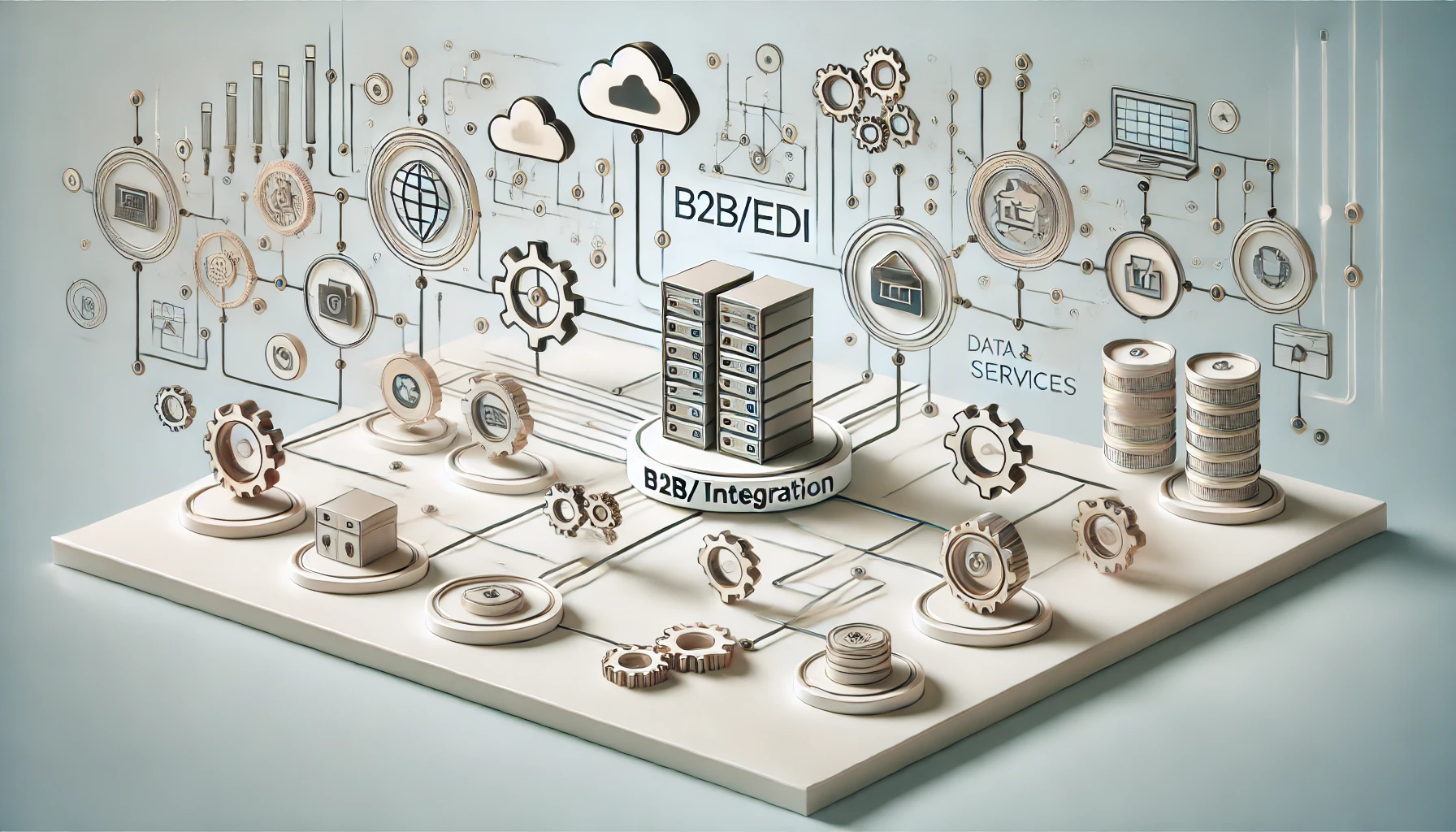In the realm of B2B/EDI integration services, you encounter a multitude of challenges in B2B/EDI Integration services that demand your attention and expertise. From ensuring seamless data compatibility to navigating the labyrinth of communication protocol variations among partners, each hurdle presents a unique set of obstacles to overcome. As you delve into the intricacies of integration processes, the need for robust security measures and scalable solutions becomes apparent. But how do you tackle these challenges effectively and ensure a smooth and efficient integration experience? Let’s explore further.
Data Compatibility Issues
Navigating the realm of B2B/EDI integration services can be a complex journey, particularly when faced with the challenge of data compatibility issues. One critical aspect of managing data compatibility is ensuring that system updates are synchronized across all platforms. When systems are not updated simultaneously, it can lead to discrepancies in data formats, causing errors during integration processes. Robust error handling mechanisms are essential to address these issues promptly.
Effective error handling procedures involve identifying the root cause of data compatibility errors and implementing corrective actions swiftly. By monitoring error logs and conducting regular audits, you can proactively address any discrepancies that arise due to system updates. Additionally, establishing clear guidelines for error resolution and escalation procedures can streamline the troubleshooting process and minimize disruptions in the integration flow. Remember, proactive error handling is key to maintaining seamless B2B/EDI integration services amidst data compatibility challenges.
Communication Protocol Variances
When dealing with B2B/EDI integration services, one significant challenge that organizations often encounter is the presence of communication protocol variances. Protocol standardization plays a crucial role in ensuring seamless communication between different systems. However, in the realm of B2B/EDI integration, various partners may use different communication protocols, such as AS2, FTP, or even newer options like APIs. These differences can lead to compatibility issues, making it difficult for systems to exchange data effectively.
To address communication protocol variances, organizations need interoperability solutions. One common approach is to implement middleware that can translate messages between different protocols. This middleware acts as a bridge between systems using diverse communication standards, facilitating data exchange without requiring all parties to switch to a single protocol. Additionally, establishing clear communication standards and protocols within the industry can help promote consistency and interoperability among partners.
Integration Complexity
Amidst the challenges posed by communication protocol variances in B2B/EDI integration services, another formidable obstacle that organizations confront is the realm of integration complexity. This complexity arises from the intricate processes involved in aligning disparate systems and ensuring seamless data flow. The following factors contribute to the intricacy of integration:
- System Configuration: Configuring different systems to communicate effectively with each other can be a daunting task. It involves setting up data mappings, defining workflows, and ensuring compatibility between various software applications.
- Integration Testing: Testing the integration between systems is crucial but can be time-consuming and labor-intensive. It requires thorough validation of data exchanges, error handling mechanisms, and end-to-end process flows to ensure that the integrated systems function correctly.
- Data Transformation: Converting data formats between systems adds another layer of complexity. This process involves translating data structures, handling data validation rules, and ensuring data integrity throughout the integration process.
Addressing these integration complexities requires meticulous planning, robust testing strategies, and continuous monitoring to ensure a smooth and efficient B2B/EDI integration process.
Security Concerns
Security concerns in B2B/EDI integration services are paramount in ensuring the protection of sensitive data and maintaining the integrity of business transactions. Implementing robust cybersecurity measures is crucial to safeguard against potential threats. Encryption techniques play a vital role in securing data during transmission between different systems. By encrypting the data, it becomes unreadable to unauthorized parties, ensuring confidentiality.
Cybersecurity measures such as firewalls, intrusion detection systems, and regular security audits are essential components of a comprehensive security strategy in B2B/EDI integration services. Firewalls act as a barrier between the internal network and external systems, monitoring and controlling incoming and outgoing traffic based on predetermined security rules. Intrusion detection systems help identify and respond to potential security breaches in real-time, mitigating risks promptly.
Utilizing advanced encryption techniques like asymmetric encryption for secure key exchange and symmetric encryption for data transmission adds layers of protection to sensitive information. Employing these cybersecurity measures and encryption techniques strengthens the overall security posture of B2B/EDI integration services, safeguarding against cyber threats and unauthorized access.
Scalability Challenges
Following the discussion on security concerns in B2B/EDI integration services, the focus now turns to the scalability challenges faced by organizations in managing their integration processes efficiently. When it comes to scalability, organizations encounter various hurdles that impede seamless growth and operations.
- System Limitations: Existing systems may not be able to handle the increased volume of transactions as the business expands, leading to bottlenecks and performance issues.
- Technology Upgrades: Upgrading legacy systems to support scalability can be complex and costly, requiring meticulous planning and execution to ensure minimal disruption to ongoing operations.
- Resource Allocation: Adequately allocating resources such as hardware, software, and skilled personnel to scale the integration infrastructure is crucial but often challenging due to budget constraints and competing priorities.
In overcoming these scalability challenges, organizations need to carefully assess their current systems, plan for technology upgrades, and allocate resources efficiently to ensure a smooth transition towards a scalable B2B/EDI integration environment.
Frequently Asked Questions
How Can B2b/Edi Integration Services Improve Supply Chain Visibility?
To improve supply chain visibility, b2b/edi integration services can enhance real-time tracking and data analytics. By promoting collaboration and transparency, these services enable efficient data sharing among partners, leading to better decision-making and streamlined operations.
What Are the Best Practices for Ensuring Data Accuracy in Integration Services?
To ensure data accuracy in integration services, focus on data validation and error prevention. Implement automated checks, enforce data standards, conduct regular audits, and train users. Utilize robust validation tools and error handling mechanisms for efficient operations.
How Do Businesses Handle Vendor Onboarding Challenges in B2B Integration?
Tackling vendor onboarding challenges in B2B integration involves streamlining processes for efficient vendor management. Enhance integration efficiency by optimizing the onboarding process, ensuring seamless data synchronization. It’s crucial to master these steps, even if it feels like climbing Mount Everest.
Can B2B Integration Services Help Reduce Manual Data Entry Errors?
By implementing B2B integration services, you can significantly reduce manual data entry errors through data automation processes and advanced error detection mechanisms. This streamlines operations, enhances accuracy, and boosts efficiency within your organization’s workflow.
What Role Does AI and Machine Learning Play in Modern Integration Solutions?
Imagine the possibilities with AI and machine learning in modern integration solutions. Automation benefits amplify efficiency gains through predictive insights. Data analytics become more robust, enabling real-time decision-making. Embrace the future of integration services.



